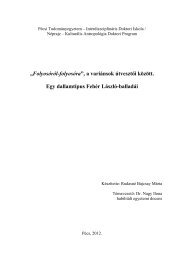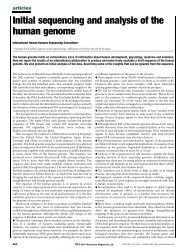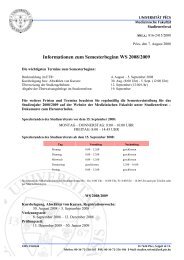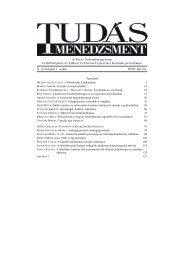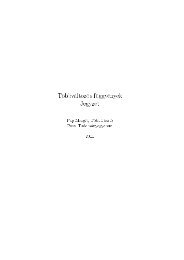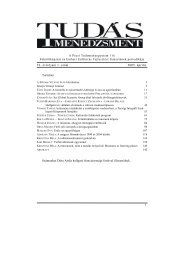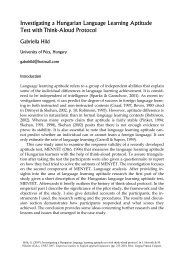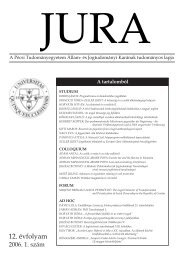The findings concerning <strong>the</strong> non-significant relationships between FL aptitude,strength <strong>of</strong> motivation and FLA, and also <strong>the</strong> very weak association <strong>of</strong> anxietywith perfectionism in <strong>the</strong> present investigation, however, should not be taken toindicate that <strong>the</strong>se individual factors cannot play a part in FLA. The results pertainingto <strong>the</strong>se variables may be attributable to <strong>the</strong> specific sample used in thisstudy, consisting <strong>of</strong> EFL majors - would be specialists <strong>of</strong> <strong>the</strong> English languageonly. A series <strong>of</strong> ANOVAs revealed that while participants with high-, mid-, andlow levels <strong>of</strong> FLA significantly differed with regard to <strong>the</strong>ir L2-related selfperceptions(F = 40.908, p < .0005), pr<strong>of</strong>iciency level (F = 19.103, p < .0005), anddegree <strong>of</strong> competitiveness (F = 3.722, p = .028), <strong>the</strong>y did not show significant differencesin terms <strong>of</strong> <strong>the</strong>ir aptitude for FL learning (F = 3.116, p = .051), nei<strong>the</strong>r did<strong>the</strong>y in <strong>the</strong> strength <strong>of</strong> <strong>the</strong>ir motivation for learning English (F = 1.753, p = .178),nor in how perfectionist <strong>the</strong>y were (F = 2.650, p = .075). Therefore, fur<strong>the</strong>r researchis needed with different learner populations in various instructional settings toclarify <strong>the</strong> role <strong>of</strong> FL aptitude, motivation, and perfectionism in anxiety about L2learning and performance.ConclusionThis article examined six learner variables as potential predictors <strong>of</strong> FLA, namely,pr<strong>of</strong>iciency, FL aptitude, strength <strong>of</strong> motivation, L2-self-concept, competitiveness,and perfectionism. The purpose <strong>of</strong> <strong>the</strong> investigation was to test earlier assumptionsconcerning <strong>the</strong> role <strong>of</strong> <strong>the</strong>se variables in FLA, which were ei<strong>the</strong>r based onqualitative findings (competitiveness, perfectionism), or on <strong>the</strong> results <strong>of</strong> studiesinvestigating <strong>the</strong> relationship <strong>of</strong> a given variable to FLA in isolation (L2 pr<strong>of</strong>iciency,FL aptitude, motivation, L2-related self-perceptions). The combination <strong>of</strong>bivariate and multivariate analyses in <strong>the</strong> present study made it possible to consider<strong>the</strong> impact <strong>of</strong> each selected learner characteristics in its own right, as well asin <strong>the</strong> company <strong>of</strong> o<strong>the</strong>r learner variables, which proved useful in assessing <strong>the</strong>irimportance in participants’ FLA in a more reliable manner. As has been shown,some findings <strong>of</strong> <strong>the</strong> study have confirmed previous assumptions (L2-related selfperceptionsand competitiveness), some added new insights to earlier interpretations(pr<strong>of</strong>iciency), while o<strong>the</strong>rs call for fur<strong>the</strong>r research (perfectionism, FL aptitude,strength <strong>of</strong> motivation).The first important result <strong>of</strong> <strong>the</strong> investigation was <strong>the</strong> close link between learners’L2-related self-perceptions and <strong>the</strong> anxiety <strong>the</strong>y experience in L2 situations.Although previous research has documented an inverse relationship between selfperceivedpr<strong>of</strong>iciency and FLA, o<strong>the</strong>r L2-related self-perceptions have receivedless attention. The present study found that L2-self-concept, a composite <strong>of</strong> variousL2-related self-perceptions, was <strong>the</strong> most useful predictor <strong>of</strong> first year Englishmajors’ FLA. The finding that L2-related self-perceptions were far better indicators<strong>of</strong> participants’ FLA than <strong>the</strong>ir measured pr<strong>of</strong>iciency in English lends empiricalsupport to <strong>the</strong> view that this type <strong>of</strong> anxiety “is not <strong>the</strong> result <strong>of</strong> a rational analysis<strong>of</strong> ones actual target language abilities” (Horwitz, 1996, p. 367). In o<strong>the</strong>r words,142 UPRT 2007: Empirical studies in English applied linguistics
FLA is not to be seen as merely an effect or result <strong>of</strong> poor achievement in languagelearning (Sparks et al., 2000). The multivariate analyses showed that reliance oncorrelations alone, may lead to spurious results. Had <strong>the</strong> effect <strong>of</strong> pr<strong>of</strong>iciency beenexamined only in isolation, <strong>the</strong> more than moderate correlation with participants’FLA scores would have suggested a more important role for this variable in learners’experience <strong>of</strong> FLA than <strong>the</strong> results <strong>of</strong> <strong>the</strong> final multiple regression model inthis study, which showed that L2-self-concept dominated L2 pr<strong>of</strong>iciency with respectto <strong>the</strong> prediction <strong>of</strong> FLA.Ano<strong>the</strong>r important finding is that it was a personality variable, competitivenesswhich turned out to be <strong>the</strong> second best predictor <strong>of</strong> participants’ Englishrelatedanxiety. Not only did <strong>the</strong> present investigation lend support to qualitativefindings suggesting that learners’ anxiety about FL learning and performance maybe related to <strong>the</strong>ir trait <strong>of</strong> competitiveness, it also showed that it is not competitivenessitself, but ra<strong>the</strong>r this trait in conjunction with a negative L2-self-conceptthat can be taken as a fairly good indication that a learner is likely to experienceFLA. This was evidenced by <strong>the</strong> multiple regression finding that as much as 63.2%<strong>of</strong> <strong>the</strong> variability <strong>of</strong> first year English majors’ anxiety level was attributable to differencesin how competitive <strong>the</strong>y were and how positive or negative L2-relatedself-perceptions <strong>the</strong>y had.The remaining three learner characteristics, FL aptitude, perfectionism, andstrength <strong>of</strong> motivation, were not found to be predictors <strong>of</strong> L2-related anxiety inthis sample <strong>of</strong> first year English majors, as suggested by <strong>the</strong>oretical predictionsand empirical findings in some previous investigations. Students with high, mid-,and low levels <strong>of</strong> FLA in this study did not show significant differences in terms <strong>of</strong><strong>the</strong>se variables, <strong>the</strong>refore it will be <strong>the</strong> task <strong>of</strong> future research to fur<strong>the</strong>r explorehow <strong>the</strong>se individual learner characteristics relate to feelings <strong>of</strong> L2-related anxietyin more heterogeneous samples <strong>of</strong> different learner populations.Tóth, Zs. <strong>Predictors</strong> <strong>of</strong> foreign-language anxiety 143



